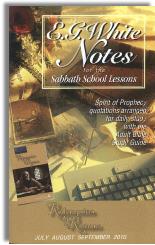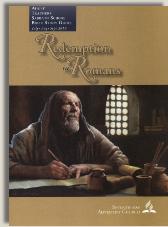|
||||||||||||||
Commentary on "The Election of Grace"
Day 2: Sunday, September 5, 2010 - The End of the Law
Overview
Today’s lesson opens with the request that the reader read Romans 10:1-4, then continues to talk about “legalism”. It continues by saying Romans 10:4 is important, but that its point is that “righteousness was offered to all who would fix their faith in Christ. He was the one to whom the ancient ceremonial system had pointed.”
The lesson end with a two-paragraph argument as to why the Ten Commandments cannot be the law that Paul means in this text. It argues that the phrase “Christ is the ‘end’ of the law” (Rom. 10:4) does not mean the law came to an end for those who believe in Christ. Rather, the lesson claims that the law merely leads to tis “goal” or “purpose”which is Jesus. To say the Decalogue is “nullified is to draw a conclusion that goes against so much else of what Paul and the New Testament have to say. The lesson concludes with thought questions about how “good” we think we are and suggests we compare ourselves to Christ “and then think about how ‘good’ you really are.”
Observations
Romans 10:1-4 says this:
Brothers, my heart’s desire and prayer to God for them [Jews] is that they may be saved. For I bear them witness that they have a zeal for God, but not according to knowledge. For, being ignorant of the righteousness of God, and seeking to establish their own, they did not submit to God’s righteousness. For Christ is the end of the law for righteousness to everyone who believes.
This text is a clear expression of the hope and freedom of the true gospel. Zeal for God if a person does not know the gospel or have a right perception of God does not result in righteousness or in salvation. Yet the lesson opens with a discussion of legalism, asserting that every moment we must keep Christ’s righteousness before us to contrast with our sinfulness and to protect ourselves from legalism.
The second paragraph contrasts trying to establish “our own righteousness” with “the true way of righteousness” which “was offered to all who would fix their faith in Christ.
In Adventism, “righteousness…offered to all who would fix their faith in Christ” means an can finally begin to become righteous when they accept Jesus because they now have God to help them overcome sin.
In reality, the righteousness Romans 10:4 is speaking of is a righteousness which has nothing whatsoever to do with obedience to the law. Christ, the text says, is the “end of the law for righteousness to everyone who believes.”
These words mean exactly what they appear to mean. When a person places his faith in Christ, he is sealed by the Holy Spirit and passes from death to life. John 5:24 says,
Truly, truly, I say to you, whoever hears my word and believes him who sent me has eternal life. He does not come into judgment, but has passed from death to life.
When a person is born of the Spirit, he receives the actual resurrection life of Christ by His Spirit (Romans 8:11). God then credits Jesus and His eternal attribute of perfect righteousness to the believer. Paul said in Philippians 3:9 that he had suffered the loss of all things to that he could:
“gain Christ and be found in him, not having a righteousness of my own that comes from the law, but that which comes through faith in Christ, the righteousness from God that depends on faith.”
Nowhere does the New Testament say we become perfect or righteousness in ourselves when we have faith in Jesus. On the contrary, it says exactly the opposite…that the righteousness we receive is the literal righteousness of Christ credited to our account. In Romans 4:3 Paul quotes Genesis 14:6 where it says of Abraham,
“Abraham believed God, and it was counted to him as righteousness.”
Righteousness is credited to us because we believe God and accept Jesus’ blood as payment for our sin. NEVER does the New Testament say that the righteousness we gain because of Jesus has anything at all to do with demonstrating obedience. The lesson ends with a defense of the Ten Commandments, especially the fourth. Unfortunately, the lesson doesn’t say that the day’s passage, Romans 10:1-4, is actually referring to the Ten Commandments including the fourth commandment .
When Jesus came, He fulfilled the law. Now, we can directly enter the presence of God because of Jesus’ blood. Jesus’ blood cleanses us from all sin, and we receive life in our spirits from the indwelling Holy Spirit upon our belief and trust in Him. This righteousness that belongs to Jesus is credited to us. This is the righteousness that Romans 10:4 is speaking of: “a righteousness apart from the law”. It is completely alien to us.
To say the Ten Commandments are not done away with is to twist and contradict Scripture. First, to say the commandments are “fulfilled” is different from saying they’re “done away with”. If they are fulfilled, then something new takes their place. To say they are “done away with” suggests there is a vacuum where they had been. Because Jesus fulfilled them, we now look to Jesus, not to the law. Jesus Himself is our righteousness, and when we are indwelt by the Holy Spirit, we literally have Righteousness in us.
Paul never says the law continues in the new covenant. Rather, in Romans 7 he explains that the law is like a will, and for a will to go into effect, someone must die. Jesus has died, so the Old Testament “will” or covenant has been realized. The promises have been fulfilled. Jesus has come, and He is now our Savior and our Righteousness.
When the contents of a will are dispersed to a person’s heirs, the written will is no longer binding because the inheritance has been distributed. It is not “done away with”—it is fulfilled. The heirs have their promised inheritance. This is the case with the Law. Jesus has died and risen again, and the law has entirely been fulfilled in Jesus. Believers now have His life and righteousness.
Morality does not originate in the law. It is an eternal attribute of God. For this reason, principles of moral living are proclaimed in the New Testament; they are not a continuation of the Old Covenant. Just because the words of the Law are similar to many of the New Testament’s exhortations does not mean the New Testament repeats the law.
Rather, the New Covenant is NEW, not a continuation of the old. The same words may be used in both, but the fact that words are similar does not make the covenants the same. The entire administration of the old and the new covenants are different. The old covenant depended upon Israel’s promises to obey; the new depends upon God’s promises alone. Jesus died and rose again to fulfill the old covenant and to usher in the new; He keeps the new covenant for us with the Father. As our human representative, He guarantees that we will be counted righteous when we believe.
Questions of whether or not we are good compared to others or compared to Jesus are moot points. When we are born again, God does not compare us to Jesus. Rather, He looks at Jesus in order to see us. We are hidden in Him, and Jesus’ righteousness is what God sees.
Summary
- Romans 10:1-4 means exactly what it says; Christ is the end of the law for righteousness to those who believe.
- When we place our faith in Christ, we are credited with the literal righteousness of Christ.
- Christ’s righteousness is not His good behavior; it is His identity, His utter unblemished, sinless perfection.
- We do not gradually become righteous when we are born again; rather, we are immediately credited with the full amount of Jesus’ unblemished perfection and righteousness.
- The new covenant is not a continuation of the old. Rather, it is a new administration entirely marked by our receiving the life of Jesus bringing our dead spirits to life by the indwelling Holy Spirit.
- The commandments are not nullified but fulfilled. The Lord Jesus takes the place of the commandments as the rule of faith and practice for believers.
- The issues is not how good we are compared to Jesus. The real issue is this: are we alive with the Spirit and hidden with Christ in God (Col 3:3).
Copyright 2010 BibleStudiesForAdventists.com. All rights reserved. Revised September 4, 2010. This website is published by Life Assurance Ministries, Glendale, Arizona, USA, the publisher of Proclamation! Magazine. Contact email: BibleStudiesForAdventists@gmail.com.
The Sabbath School Bible Study Guide and the corresponding E.G. White Notes are published by Pacific Press Publishing Association, which is owned and operated by the Seventh-day Adventist church. The current quarter's editions are pictured above.
Official Adventist Resources
Standard Edition Study Guide Week 11
Teacher's Edition Study Guide Week 11
Easy Reading Edition Study Guide Wk 11
Search the Complete Published Ellen G. White Writings


